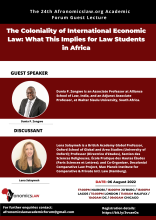Book Review: “Populism and Antitrust: The Illiberal Influence of populist Government on the Competition Law System.” (2022) Cambridge University Press; Cambridge-Maciej Bernatt
This book is a great opportunity to swim in a new ocean. Few authors and scholars can combine, with elegance, efficiency and intellectual strength, a very attractive analysis of the influence of a political phenomenon (populism) and a technical/legal/ microeconomic field as the Competition Law.

